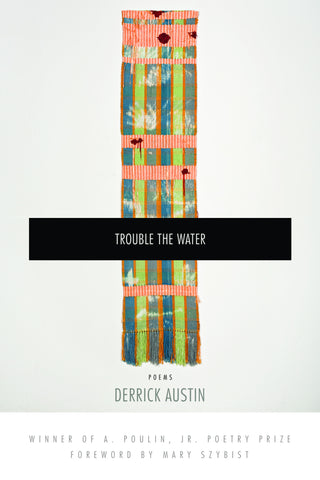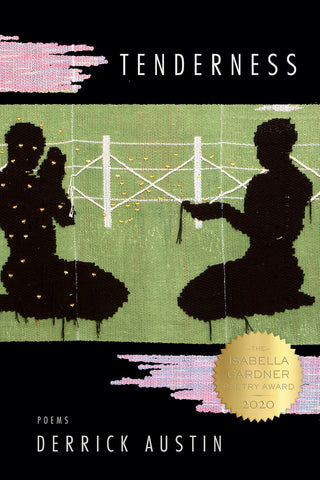
About This Title
Winner, A. POULIN, JR. POETRY PRIZE
Finalist, 2017 Kate Tufts Discovery Award
2017 Thom Gunn Award for Gay Poetry
2017 Lambda Literary Award for Gay Poetry
2017 Norma Farber First Book Award
Rich in religious and artistic imagery, Trouble the Water is an intriguing exploration of race, sexuality, and identity, particularly where self-hood is in constant flux. These intimate, sensual poems interweave pop culture and history—moving from the Bible through several artistic eras—to interrogate what it means to be, as Austin says, “fully human as a queer, black body" in 21st century America.
“Primer for Sainthood”
So you want to kiss the passionflowers
in his hands, the blooming flies and blood?
So you would fast and serve his meals,
meats and bread, liquors, sweets?
Happily, you say, drunk on the waters
of his smile. And if he does not smile
that day? If out of boredom he says, kneel
and wash my feet, every day you must
drink of this water. Happily, you say. Again
with this happiness. And if he breaks you?
Batters you with his fists? Batters you
like a dorr and hands back your happiness
—a dozen knocked teeth—would you say
Again my lord? What wouldn’t you pay
for an endless night with the god? O you
who would starve for such music,
there is another sweetness saved for those
who wash and bind the wounds, who join the feast.
Praise for Trouble the Water
“Skilled with the ability to harness detail and stringent images, Derrick Austin creates a lush and smoldering landscape in which the very soul is tested. Trouble the Water is a book of devotion, a metaphysical book that troubles God, the landscape of Florida, the always-fallible bodies of men, and even the body of art. Austin writes: ‘Lord in the pigment, the crushed, colored stones. / Lord in the carved marble chest. I turn away / from art.’ But you will not be able to turn away from this beautiful debut.”—C. Dale Young
“Austin’s remarkable debut collection opens with a quote from John 5:4–6 . . . foreshadowing how water, religion/spirituality, and body focus become vehicles to explore being black, homosexual, male, and a human being in a troubling century. ‘San Souci’ epitomizes the sophistication of form and thought in Austin’s poetry by using an effect resembling Versailles’ Hall of Mirrors as the poem’s speaker reflects on paintings, how they reflect life, his body, his lover’s body, how he can see his lover as a painting or see the act of pleasuring another artfully reflected back to him. Whether encountering European catacombs or the Gulf Coast’s post-oil-spill devastation, all of Austin’s lyrical poems are poignant and empowered.” —Booklist, *Starred*
“This collection is well-suited to readers prepared interrogate what they love and what they distrust. In Austin’s hands, the exquisite can be ominous while the grotesque can turn charming, and his poems wisely assert that the world is unforgiving and yet full of mercy—that one can question beauty and yet still be beholden to it.” —Publishers Weekly
“Trouble the Water is an auspicious debut, a deep and resonant volume which nurses wonder in the face of sorrow and anger, wonder in the presence of loss. Here we follow a speaker who proclaims early on, “my heart swims/ in gladness at the changeable world.” I want to keep these words as a credo, recite them often. I want to receive the world this way every day.” —The Rumpus
“Derrick Austin’s stunning debut, Trouble the Water, gives readers unique insight on what it means to be a queer, black man in today’s world. He navigates the complicated worlds of race, sexuality, and religion with such fearlessness that we as readers can’t turn away even if we wanted to. . . . Austin is an important voice in poetry. His book comes at a time when it is becoming more and more difficult to ignore the social injustices these communities face. Trouble the Water is not just the title of Austin’s book; it is a command. The only question now is whether or not we will listen.” —PANK Magazine
“‘Expect poison of the standing water,’ Blake warned, highlighting the dangers of imaginative stagnation. I’m now tempted to believe that Blake himself has sent us Derrick Austin and his remarkable collection, Trouble the Water. At once gospel and troubadour song, these deeply spiritual and expansively erotic poems are lucid, unflinching, urgent. This is an extraordinary debut.”—Mary Szybist, winner of the National Book Award
Publication Date: April 12, 2016
ISBN: 978-1-942683-04-9
© BOA Editions, Ltd. 2016


